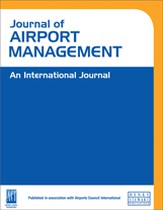Using the AHP method to identify the relative effectiveness of Brazilian aviation security measures
Abstract
The risk assessment method applied to aviation security assists in the decision-making process of air transport managers, contributing to the efficient allocation of resources. Through the application of the pairwise comparison of the analytic hierarchy process (AHP), it is intended to demonstrate and identify the relative effectiveness of security measures applied to Brazilian air transport system, considering different threat scenarios to the air transport operations. Data collection was performed through a questionnaire distributed to aviation security specialists. The results indicate that the degree of the measures effectiveness varies according to the threat and allowed to define fundamental parameters in the process of risk management and in the prioritisation of the oversight by the relevant Brazilian authorities.
The full article is available to subscribers to the journal.
Author's Biography
Rafael Rodrigues Dias Pereira holds a position of Civil Aviation Regulation Specialist at Brazilian Civil Aviation Authority (ANAC). He has been coordinating projects related to air cargo secure supply chain and the revision of relevant aspects of the National Civil Aviation Security Training Programme (NCASTP). He has 12 years of experience in the areas of regulation and oversight of the Brazilian civil aviation industry, with an emphasis on airport and airline security operations (2007–2019). He held the position of deputy technical manager in the Aviation Security Division at ANAC from 2012 to 2013 and from 2016 to 2019. He has a Masters in Transportation from the University of Brasília (2016), with development of research line on reliability and vulnerability of transport networks and critical infrastructures. He accomplished a Civil Aviation Regulation specialized course from the Federal University of Rio de Janeiro (2007). He graduated in Electrical Engineering from the Federal University of Goiás (2006). He has had two years and a half of experience in the food industry, working in the areas of production planning and maintenance (2005–2007).
Luiz Gustavo Silva Cavallari has ten years of aviation security experience since his inception in the National Civil Aviation Agency (ANAC) as a civil aviation specialist. In November 2010, he assumed a technical manager position, leading a team responsible for all aviation security matters in the ANAC. In 2014, the ANAC created a new security technical division, when he became the Quality Control Technical Manager, being charged to develop the National Security Civil Aviation Quality Control Program. In March 2017, he assumed the current position, becoming the manager of ANAC’s civil aviation security branch. He was certified as auditor in the Universal Security Audit Program (USAP; program of International Civil Aviation Organization [ICAO]) in 2010, and since then he has developed audits in some countries for ICAO. Since 2017, he has been the Brazilian member of the Civil Aviation Security Panel in ICAO. Prior to the ANAC, Luiz worked a half year for the Highway Department from Paraná’s State in the area of engineering. He graduated in Civil Engineering in 2008 from the State University of Maringá (UEM) and has attended several courses in aviation security and managing areas. He speaks Portuguese, Spanish and English.
Pastor Willy Gonzales Taco is a graduate in Civil Engineering from the National University of San Agustín, Arequipa (UNSA) in 1991, a Master degree holder in Urban Transportation form the University of Brasilia (UnB) and a PhD holder in Transportation Engineering from São Carlos Engineering School of the University of São Paulo (EESC/USP) in 2003. From an associate professor he became a full-time professor at the Civil and Environmental Engineering Department (ENC/UnB) and Post-Graduate Program in Transportations. He was the former Coordinator for the Civil Engineering Undergraduate Department, a former Coordinator for Núcleo Docente Estruturante for the Civil Engineering Undergraduate Department, a Tutor for the Technological Innovation Group, the leader of Transportation Behavior and New Technology Group (CTNT) registered with the National Council for Scientific and Technological Development (CNPq) and a Startup Adviser for Carona Phone Shared Transport. He is involved in research in transportation planning, activities-based travel approach; behavioral analysis in transportation; geographic information systems in transportations; new technologies in transportations; innovation and disruptive technologies in transportations and urban mobility; intelligent transportation and mobility systems; autonomous road vehicles, connected and shared; intelligent road corridors (CRIs); workplace travel plans intelligent, sustainable and healthy; reliability, vulnerability and resiliency in transportation networks; and mobility, accessibility and smart cities.
Diana Helena Ferreira graduated in Pedagogy from the University of Brasilia (UnB) and is pursuing a masters in psychology from the Catholic University of Brasilia (UCB). Since 2008, she has worked as civil aviation regulation specialist at the National Civil Aviation Agency (ANAC), where she focuses on the areas of facilitation and aviation security (AVSEC). She conducts activities such as audits and inspections of AVSEC airlines, airports and instruction centres and AVSEC instructor’s certification, conducts manual reviews and participates in facilitation committee meetings. Besides that, since 2018, Diana has been an USAP–CMA auditor (AVSEC audit) certified by the International Civil Aviation Organization (ICAO).
